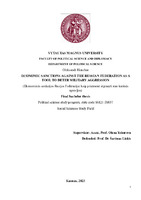Показати скорочений опис матеріалу
ECONOMIC SANCTIONS AGAINST THE RUSSIAN FEDERATION AS A TOOL TO DETER MILITARY AGGRESSION
| dc.contributor.author | Гончар, Олександр | |
| dc.date.accessioned | 2023-06-30T08:23:42Z | |
| dc.date.available | 2023-06-30T08:23:42Z | |
| dc.date.issued | 2023-06-22 | |
| dc.identifier.uri | http://ir.nmu.org.ua/handle/123456789/163901 | |
| dc.description.abstract | In recent years, the Russian Federation's military activities and geopolitical ambitions have raised concerns among the international community. To address these concerns and discourage further military aggression, several countries and international organizations have resorted to economic sanctions as a deterrent strategy. This bachelor thesis aims to examine the effectiveness of economic sanctions imposed on the Russian Federation as a means of deterring military aggression. The study begins by providing a comprehensive overview of economic sanctions, their historical context, and theoretical foundations. It explores the different types of economic sanctions, including trade restrictions, financial measures, and diplomatic actions, highlighting their potential advantages and limitations as tools of coercion. Using a case study approach, the thesis analyzes prominent instances of economic sanctions imposed on the Russian Federation in response to military aggression or perceived violations of international norms. These case studies include sanctions related to conflicts in Ukraine, the annexation of Crimea, and alleged cyber- attacks, among others. The analysis examines the goals, implementation strategies, and outcomes of these sanctions, considering factors such as their economic impact, political dynamics, and the intended behavioral changes in the Russian government. Furthermore, the study assesses the effectiveness of economic sanctions as a deterrent tool in the context of the Russian Federation's military aggression. It explores the correlation between the imposition of sanctions and changes in the Russian government's behavior, military activities, and foreign policy objectives. Additionally, the thesis investigates unintended consequences, such as shifts in alliances, economic vulnerabilities, and the impact on civilian populations. The findings of the case study analysis provide valuable insights into the efficacy and limitations of economic sanctions as a deterrent strategy against the Russian Federation's military aggression. The research contributes to the existing literature by enhancing our understanding of the complex dynamics between economic sanctions, political decision-making, and military behavior. | uk_UA |
| dc.language.iso | en | uk_UA |
| dc.subject | Russian Federation's military aggression, economic sanctions, the annexation of Crimea. | uk_UA |
| dc.title | ECONOMIC SANCTIONS AGAINST THE RUSSIAN FEDERATION AS A TOOL TO DETER MILITARY AGGRESSION | uk_UA |
| dc.type | Other | uk_UA |

